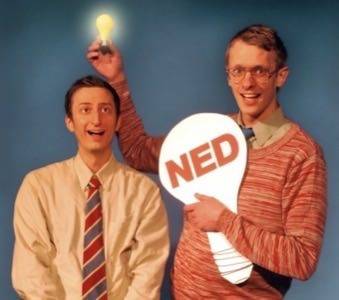Who doesn’t at least like TED Talks, the “Technology, Entertainment and Design” conference that aims to smarten us up without asking us to work very hard? We sit at our computers, watch someone give an 18-minute-long talk, and believe that we are rapidly learning and understanding complex ideas. This is much better than wasting time pinning cat images to Pinterest or messing with the Google LOLcat generator. TED Talks’ shareable quotes make it feel even easier to spread great TED ideas via Facebook and Twitter. After all, says TED Media’s Executive Producer Julie Cohen, “Quotes are ideas – in their post compressed and contagious form.”

But what if the very talks that we believe are making us smarter are actually dumbing us down, simplifying complex ideas into snippets of “shareable” information apt for fast consumption? This is why Chicago-based improvisers Seth Dodson and Kellen Alexander created “NED Talks: Spreading Worthless Ideas,” a spoof of the popular TED Talk videos. Their show challenges the entire structure upon which TED is built.
“The idea for NED Talks came about after watching TED Talks,” says co-creator Kellen Alexander. “We thought that it looked like fun to give presentations, and we figured we should create one for people who like to talk into microphones but have nothing worthwhile to say.”

Yet it’s clear that Americans love TED, and TED videos have spread far and wide. If they’re so stupid and pointless, however, how could this have happened?
Alexander likens the spread of TED Talks in pop culture to the reality TV phenomenon.
“When the first season of “The Real World” started, it was the most authentic. Then it got progressively less authentic because the people that went on the next seasons of the show started acting based on the seasons they’d seen,” he says. “So then it digressed into what people see now, which is basically just getting into arguments and hooking up.”
TED Talks began in 2006. Now, six years later, TED has become a household, brand name, akin to Apple or Honda. Stories like this piece in last month’s issue of The Atlantic suggest exactly what Dodson and Alexander realized more than a year ago, long before this article was written. Writes Megan Garber:
We talk often about the need for narrative in making abstract concepts relatable to mass audiences; what TED has done so elegantly, though, is to replace narrative in that equation with personality. The relatable idea, TED insists, is the personal idea. It is the performative idea. It is the idea that strides onstage and into a spotlight, ready to become a star.
Once seen as a crowning achievement in one’s intellectual career, today TED Talks feel more like status symbols, a notch on the bedpost, something to highlight on a resume rather than a truly intellectual endeavor into unknown territory. Or, an inculcation into the cult of social media celebrity.
This is not to belittle some of the ideas put forth by those who have presented at TED. But there’s something reality TV show-esque about the whole thing, about recognition in the American social media-ified pop culture landscape. Which brings us back to NED Talks and reality TV.
“Countess LuAnn de Lesseps of The Real Housewives of New York City once said: ‘Always know what you want,'” Alexander says.
“I thought that was very inspirational.”
Dodson and Alexander will be back for another installment of NED Talks in June 2012. In the meantime, please enjoy this video from a NED Talk by Miami Volt.
NED Talk image courtesy of Kellen Alexander and Seth Dodson.

















